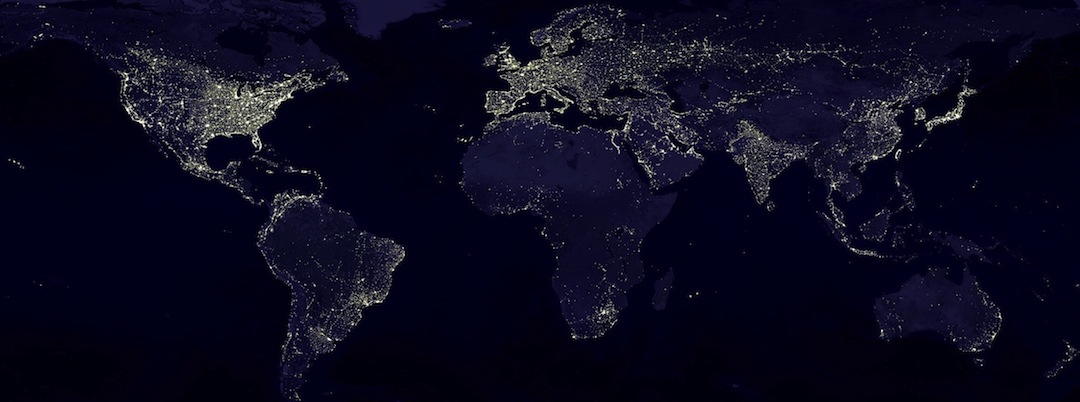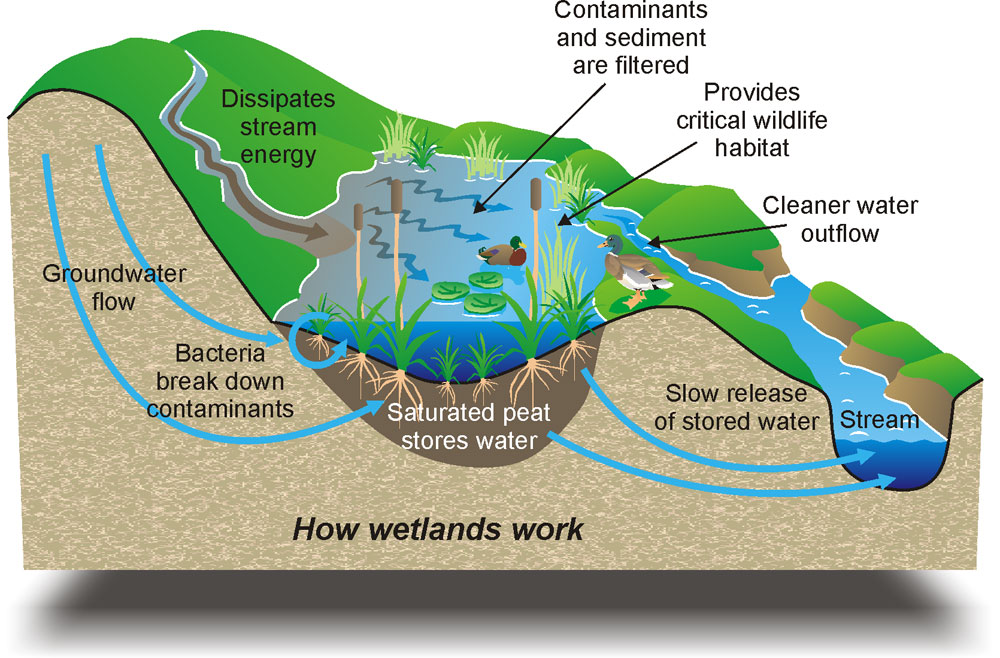
 The problems associated with global change directly influence our quality of life because
we depend on predictable patterns of climate, weather, economic cycles, population change, ecological limitations, and
institutional patterns of response to human needs. Distress in any one sector has a ripple
effect to any and all of these other related sectors. Thus a drought in Brazil influences the world markets for coffee or
orange juice just like the failure of the East Indian monsoon may signal the onset
The problems associated with global change directly influence our quality of life because
we depend on predictable patterns of climate, weather, economic cycles, population change, ecological limitations, and
institutional patterns of response to human needs. Distress in any one sector has a ripple
effect to any and all of these other related sectors. Thus a drought in Brazil influences the world markets for coffee or
orange juice just like the failure of the East Indian monsoon may signal the onset
of an El
Nino event. We are all connected to the heat engine of this planet the ocean, in ways that can be long-lasting and impossible to alter. Thus the concept of
global change is related to but not restricted merely to planetary shifts in temperature,
pressure and humidity. Long-term climate or short-term weather patterns have serious
implications for soil moisture, radiation exposure, and perturbation of drought and flood
cycles.
These altered physical conditions are serious because of their direct influence on the crops
comprising local food supplies and international trade in food and vegetable crops. Because
we change the face of the landscape due to what we eat, drink and consume as durable
goods we ought to learn how our economic choices shape the world we must adapt to for
our personal and collective survival. Because we must focus in order to learn well,
practicing our understanding of how one event triggers unintended consequences in another
realm altogether is a valuable skill when it comes to trouble shooting disruptions in any
system. Comprehending links, triggers, and unintended outcomes in a systematic fashion
ought to influence how we should learn about local, regional or global food problems .
The threat to food provisions is more than hyperbolic expressions of as
yet unaccountable risks faced by growing populations. Edward O. Wilson,
experimental biologist, argues that "Very few of the species with potential
economic importance actually reach world markets....20 species provide 90
percent of the world's food and just three -- wheat, maize, and rice --
supply more than half." of what the world eats! In relating this thin green lifeline
to biogeography he comments that "This cushion of diversity is biased
toward cooler climates, and in most parts of the world it is sown in monocultures
sensitive to disease." (Wilson, 288) Biological diversity in this view
acts as insurance against a catastrophic disruption of the producing sectors of the
international, regional and local sectors of the market.
Given the problem expressed by the Committee on the Human Dimensions of
Global Change as "the depletion of the ozone layer attributed to the
accumulation of chlorofluorocarbons (CFCs) in the stratosphere is an unintended
side effect of human industrial activities," (NRC, 17) Wilson's is
a sentinel viewpoint. Sentinel in that he is alerting us to the fact that we are vulnerable to
the disruption of our food staples. The Committee argues that "For the first time,"
due to the increasing size of the arctic and antarctic ozone holes, the
increase in the carbon content of the atmosphere and the ongoing loss of
biological diversity "human beings have begun to play a central role
in altering global biogeochemical systems and the earth as a whole."
The Committee of scientists and social scientists fears that "the earth
has entered a period of change that differs from previous episodes of global
change in the extent to which it is human in origin."
Climate expert W. John Maunder concludes that "We are certain of the
following: There is a natural greenhouse effect which already keeps the earth warmer
than it would otherwise be." He refers to the initial assessment report
of the Intergovernmental Panel on Climate Change (IPCC) that:
"Emissions resulting from human activities are substantially increasing the atmospheric concentrations of green house gases, carbon dioxide, methane, chlorofluorocarbons (CFCs) and nitrous oxide. These increases will enhance the greenhouse effect, resulting on average in an additional warming of the Earth's surface. The main greenhouse gas, water vapor,will increase in response to global warming and further enhance it." (Maunder, 141)
The scope of and depth to which these risks exist will over the coming decades
increase the need to analytically determine and synthetically evaluate the
influence of these changes on the livelihoods of people. Such a methodology requires the integration and interpretation of data from among traditionally
isolated disciplines within a behavioral and historical framework uncommon
among existing specialties except for oceanography, and to a limited extent
the microbiology and public health traditions.
To best equip a new generation of research and development into the threats
and potential opportunities involved in global climate change requires a
new pedagogy. Predictive explanations of ecological and behavioral responses
to global change rests on investigative methods that mesh quantitative reasoning,
critical thinking, visual interpretation and written expression. Language
acquisition and symbolic manipulation abilities are one cornerstone in the
incipient formulation of a new pedagogy required by the need "to focus
on human responses to to global changes." (NRC, 17) The experimental
nature of the changes in the biogeochemical milieu and of the adherent cultural
adaptations to surrounding conditions this necessitates a wedding of the
sciences and the arts at a sustained level of intimacy.
Pieces of the new pedagogy are beginning to congeal into what G. Tyler Miller
calls "the Spaceship-Earth Worldview in which the Earth is viewed as
a spaceship -- a machine that we can understand, dominate, and change at
will by using advanced technology." (Miller [1993], 27) But he warns
that this growing perspective in the environmental sciences is "an
upside-down view of reality. It thinks of the earth as a spaceship -- a
simple unsustainable human creation." The incipient stage of a new
pedagogical approach to redefining human behavior in the context of an internationally
unprecedented experimental alteration of our atmosphere, seas, and climate
requires a dialectical approach to learning characterized by Murray Gell-Mann,
theoretical physicist, as a corrective feedback approach to assessing information
inherent in all "complex adaptive systems." (Gell-Mann, 25) In
terms of Miller's approach to pedagogy the dialectical antithesis of the
spaceship-earth worldview is the sustainable earth worldview, a "life
centered approach," that conceptualizes "human beings as part
of nature -- not apart from nature," to rephrase Robinson Jeffers verse.
The dialectical thinking required by Gell-Mann's explication of the algorithmic
information content and effective complexity inherent in any data from both
natural and human systems forces learners to encourage debate. As Miller
advises we ought to "Put the poor and their environment first, not
last; help the poor sustain themselves and their local environment, and
do this with love not condescension." (Miller [1993], 29). Such an
approach to interpreting scientific data and implementing policy rests on
comprehending regional and cultural differences in the ways people symbolically
reconstruct their inhabited world. (Geertz [1973],170) Education for global
change insists that we learn more than a facility for problem solving as
the cornerstone of intellectual growth, instead it challenges us to provide
an emotional and motivational framework within which to articulate competing
ethical restraints upon our individual and collective behavior.
As embodied in the tenets of the World Conservation Strategy, the protection
of the planetary life support system and the promotion of biological diversity
will always encounter the necessity of providing adequate livelihoods for
communities whose people are and will be affected by erosion, desertification,
flooding, radiation and depletion of renewable resources. But historical
study of the responses to pestilence, urbanization, famine, and depopulation
reveals ample evidence against which to measure the predictive quality of
the negatable hypotheses that must form one basis of an emerging research
agenda. If the new pedagogy is to provide lasting interpretive value, then
it must increase our ability to solve problems and simultaneously to handle ambiguity while promoting tolerance of paradoxical findings and large degrees of uncertainty.
§§§
Cited sources:
Clifford Geertz, The Interpretation of Culture, (New York: Harper Colophon,
1973).
Murray Gell-Mann, The Quark and the Jaguar, (San Francisco: Freeman, 1994).
W. John Maunder, Dictionary of Global Climate Change, (London:University
College of London Press, 1992).
G. Tyler Miller, Environmental Science, 4th ed. (Belmont: Wadsworth, 1993).
National Research Council, Global Environmental Change, (Washington. D.C.,
National Academy of the Science, 1992).
Edward O. Wilson, The Diversity of Life, (New York: Norton, 1992).
World Conservation Monitoring Center, Global Biodiversity, (London: Chapman
and Hall, 1992).
Works consulted:
Jacob Bronowski, Science and Human Values (1979)
Preston Cloud, Cosmos Earth and Man, (1973)
Freeman Dyson, Infinite in all Directions, (1988)
R. Buckminster Fuller, Operating Manual for Spaceship Earth ,(1963)
Garrett Hardin, Living within Limits, (1992); and Filters Against Folly,
(1990)
Humphrey Jennings, Pandaemonium, (1985)
Kai N. Lee, Compass and Gyroscope (1993)
Leo Marx, The Machine in the Garden (1964)
Charles Piller, The Fail Safe Society: Community Defiance and the end of
American Technological Optimism (1991)
Tjeerd Van Andel, Tales of an Old Ocean, (1977).

Wetlands are repositories
by Joseph Siry
About: wetlands protection in history as a good example how present practices run counter to long established cultural traditions:
Key problems facing many states and localities include the following:
Water quality protection
The takings issues related to property rights
Climate change
To understand the argument, try the following list of issues and the web addresses for more details:
While all politics is local, manifestations of local power and economic control is lost today for several reasons:

Each of the above crucially significant influences are fluid–that is shifting unexpectedly–by being influenced through planetary changes especially with respect to: growing population, exponential rates of consumption, climate alteration, loss of biological diversity and the undermining of the Earth's life sustaining capacity.
Emergent properties complicate how we must effectively solve problems.
 Please send your questions or comments to J. Siry
Please send your questions or comments to J. Siry
This page was written by the above on 8-14-98, Last Updated and revised on 3-12-08 and 6-11-2011.